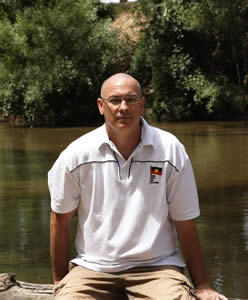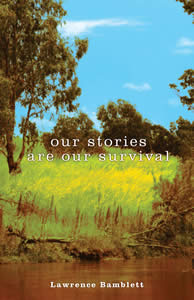AustLit
-
In the nineteenth of this series of interviews, Anita speaks to Lawrence Bamblett.
-
All the stories I grew up with impact my life. That’s how we’re taught how to act. Stories are how we learned what made you a good Wiradjuri person. But I’ve seen the work of two storytellers that I grew up around turned into books and that’s impacted on what I do. I worked as a trainee with Mary Coe when she was writing her book Windradyne: A Wiradjuri Koorie. I learned a lot watching Mary write that book. I also remember how seeing the brilliant Erambie storyteller Bobby Merritt’s play, The Cake Man, made me think about writing stories down. I’d never though about writing until then.
-
I like to read at least 4 or 5 books at one time. There must be about 20 that I suppose I’m still reading. But, on my iPad right now, I’m really reading Bernhard Schlink’s The Reader, Crimes against Humanity from Geoffrey Robertson, and I’m re-reading the ebook edition of Kevin Gilbert’s Because the White Man’ll Never Do It. I’m waiting on Matthew Reilly’s Troll Mountain so I just started a book called Reading in the Wild by Donalyn Miller and Susan Kelley while I wait. The hard copy books I’m reading are A Gathering of Old Men by Ernest Gaines (again), The Fight by Norman Mailer, Ake by Wol Soyinka, and Bruce Pascoe’s Dark Emu.
-
Norman Mailer’s The Naked and the Dead. I didn’t make it past the first chapter. Mailer’s book about the Ali-Forman fight, The Fight, is one of the best books I’ve read. It’s my favourite book about sports. I thought I’d read his other books and essays but couldn’t finish any of them.
-
I read a few books over and over. Maya Angelou’s works of biography I read a lot. There is a story where she describes a funny scene at church that I like. It reminds me of a story my mother tells about how her friends used to make her laugh in church. Angelou was the first non-Koori writer I found that had something like a Koori sense of humour. Her stories are familiar so I read them a bit.
-
I’ve always loved the way Erambie’s storytellers used words. Their particular phrasing has always made me smile. I love that they say things like, ‘We goes down town now’ when telling a story and that they use words like ‘jollification’ when telling yarns. I like the way we speak English so working with words and retelling our community stories keeps me close to the storytellers I grew up around. It keeps me close to them. If you write it down it lasts.
I starting writing down stories that I heard at Erambie when I was a teenager. I wrote them on scraps of paper. Or, even in the margins of a newspaper. Then I’d read them back to memorise. When I started university and I thought that people needed to hear how we see our own Koori communities so I started writing for other people.
-
I had to learn the basics of writing because I didn’t attend school regularly or pay attention to anything other than sport and history when I was there. So, at university I started to read a lot about writing sentences and paragraphs. I’m still working on that. I also read as much as I can. I like to read non-English speakers and other Kooris' work to see how they write in English.
-
An ability to tell a yarn, an eye for a story and a distinctive voice. I think if you read Bobby Merritt, Kevin Gilbert and Maya Angelou you can hear unmistakably their voice. I also like Ernest Gaines, Dan Brown and Matthew Reilly’s books.
-
I was lucky to work with Mary Coe. Also, Bob Merritt was family and I was lucky to grow up around him. Bob’s line from The Cake Man is my favourite line from any book. He wrote, ‘Talking life with brother Jim, tell him where’s the pain. Shake him wordstick at my mind, make me see it plain’. I think Bobby was a genius storyteller. He was good to be around because he loved to tell yarns. And he was good at it. All the Merritts I know can tell a yarn. And they're Wiradjuri. And they're from Erambie Mission.
-
I wish I had one. It changes. A lot of times lines and paragraphs come to me when I’m not writing, when I’m doing things other than sitting at a desk trying. I once thought up a line at half time when was playing for Erambie at a Knockout. Didn’t have pen or paper so had to repeat the line in my head all the second half. Other times I sit at a desk until it gets done.
-
I write the same way I read. There are a lot of yarns (works in progress) on scraps of paper around the house. One of them is a biographical story with my aunt June Murray called ‘Pennies from Heaven’. It’s about the contribution that Erambie’s entertainers made to the war effort. It’s also about how our people continued the music of our culture.
You might be interested in...






